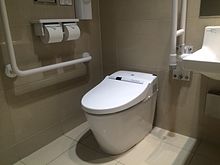Washlet
This article has multiple issues. Please help improve it or discuss these issues on the talk page. (Learn how and when to remove these messages)
|



Washlet (Japanese: ウォシュレット, Hepburn: Woshuretto) is a Japanese line of cleansing toilet seats manufactured and sold by the company Toto. The electronic bidet features a water spray element for genital and anal cleansing.[1][2][3][4] and commonly appears on toilets all over Japan.[citation needed] The device was released in June 1980[5] and as of January 2022, Toto has sold more than 60 million units.[5]
History
[edit]In the 1960s, Japanese plumbing company Toto's goal was to import American "wash air seats" for domestic sales, mainly for sale to hospitals and nursing homes. Toto began domestic production in 1969, but wash air seats were expensive and sometimes caused scalding injuries due to poor regulation of water temperature. [citation needed]
In 1980, Toto began to sell its improved Washlets in Japan after surveying employees to determine appropriate spray positions, since there were no biometric statistics available.
In the 1980s, the term "Washlet" originated by the company Toto. Recognized for its pioneering role in 2012, the original Washlet G model was certified as item 55 of Mechanical Engineering Heritage.[citation needed]
Design
[edit]In 1996, Toto also released Washlets designed for Japanese-style squat toilets, but they proved difficult to use due to accuracy issues. Japanese-style toilets were replaced with their Western-style counterparts, and the model was discontinued around 2003.[citation needed]
In October 2005, Toto released other improvements, incorporating sleep mode for energy conservation, a remote control, and a Washlet that could play MP3 audio files. Upon her visit to Japan in 2005, pop singer Madonna commented that she had "missed Japan’s warm toilet seats."[6]
Functions
[edit]This section needs expansion. You can help by adding to it. (June 2017) |
The cleansing features include buttons labeled Oshiri ("Rear") and Bidet ("Front") with translations in English speaking regions. Most current models have a sensor preventing water from spraying while a person is not sitting on the toilet.[citation needed]
For antibacterial and disinfectant purposes, the nozzle is designed at such an angle that the water does not splash back on the inside of the toilet (43º for anuses, 53º for vulvas), and the nozzle itself is washed with warm water when stowed away and before use. Anal and genital cleansing functions operate on different nozzles. Some models feature deodorizers and dryers for the user's convenience.[citation needed]
See also
[edit]References
[edit]- ^ "Toilettes. Le "Washlet" japonais veut faire son trou en Europe". Le Télégramme. 19 November 2012. Retrieved December 10, 2012.
- ^ Hasegawa, Kyoko (November 20, 2012). "Toilet maker Toto seeks global lavatory domination with Washlets". Herald Sun. Retrieved December 10, 2012.
- ^ "Japan's high-tech toilet maker eyes global throne". Rappler. 20 November 2012. Retrieved December 10, 2012.
- ^ Hasegawa, Kyoko (5 December 2012). "Japan's high-tech toilet maker eyes global throne". The Japan Times. Retrieved December 10, 2012.
- ^ a b "ウォシュレット累計出荷台数6000万台突破". Toto Ltd. (in Japanese). October 28, 2022. Retrieved January 5, 2024.
- ^ "Madonna loves warm toilet seats". News24. 2005-12-08. Retrieved 27 January 2021.
